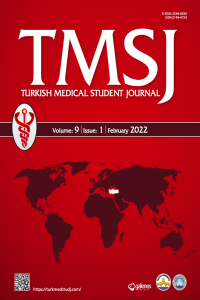INTERNET ADDICTION AND ITS IMPACT ON PHYSICAL HEALTH
INTERNET ADDICTION AND ITS IMPACT ON PHYSICAL HEALTH
Aims: Internet addiction, a recently emerged term in medical literature, has significant physical effects on the young generation. In this research, controversial effects of internet addiction on physical health have been investigated among the students of Trakya University School of Medicine, who constitute a part of the population at risk. Methods: The study included 327 medical students. The correlation between internet addiction and physical complaints associated with internet usage and its relation with gender, purpose and duration of internet usage were investigated. The data were obtained by using surveys and Internet Addiction Scale. To evaluate the data; descriptive statistics, Correlation, Mann-Whitney U tests, Cronbach alpha methods and survey with 16 questions were used for statistical analysis. Results: There is a statistically significant difference in terms of Internet Addiction Scale score between internet addiction and physical complaints such as headache, feeling of stiffness, backache, neck pain and insomnia. Internet Addiction Scale score and time spent on the internet showed a statistically significant correlation. Conclusion: Increase in internet usage leads to many physical health problems, which may cause serious and permanent damage to physical health. Therefore, the required attention must be given to this subject especially for the benefit of younger generations.
Keywords:
: Internet, medical student, headache, neck pain,
___
- 1. Aslan S, Aylaz R. Akademisyenlerin internet bağımlılık düzeyleri ve buna bağlı oluşabilecek sağlık sorunlarının değerlendirilmesi. İnönü University Journal of Health Science 2014;2(3):14-9.
- 2. Akdağ M, Yılmaz BŞ, Özhan U et al. Üniversite öğrencilerinin internet bağımlılıklarının çeşitli değişkenler açısından incelenmesi (İnönü Üniversitesi örneği). Inönü Üniversitesi Eğitim Fakültesi Dergisi 2014;15(1):73-96.
- 3. Bratter TE , Forrest GG. Alcoholism and substance abuse: strategies for clinical intervention. New York: The Free Press; 1985.
- 4. Ryding FC, Kaye LK. Internet addiction: a conceptual minefield. Int J Ment Health Addict 2018;16(1):225–32.
- 5. Dalal PK, Basu D. Twenty years of internet addiction … Quo Vadis? Indian J Psychiatry 2016;58(1):6–11.
- 6. Günüç S, Kayri M. The profile of internet dependency in Turkey and development of internet addiction scale: study of validity & reliability. Hacettepe University Journal of Education 2010;39:220-32.
- 7. Doğan A. Hanehalkı bilişim teknolojileri kullanım araştırması, 2013. Türkiye İstatistik kurumu Haber Bülteni. Available from URL: http://www.tuik.gov.tr/PreHaberBultenleri.do?id=13569 (22/08/2013).
- 8. Berber ÇÇ, Odacı H. Kendilik algısı ve benlik saygısının problemli internet kullanımı üzerindeki yordayıcı rolü. Education Sciences 2012;7(1):433-41.
- 9. Esen BK, Gündoğdu M. The relationship between internet addiction, peer pressure and perceived social support among dolescents. The International Journal of Educational Researchers 2010;2(1):29-36.
- 10. Shao Y, Zheng T, Wang Y et al. Internet addiction detection rate among college students in the People’s Republic of China: a meta-analysis. Child Adolesc Psychiatry Ment Health 2018;12:25.
- 11. Gün İ, Özer A, Ekinci E et al. Bilgisayarla çalışan kişilerin ifade ettikleri sağlık sorunları. Erciyes Medical Journal 2004;26(4):153-7.
- ISSN: 2148-4724
- Başlangıç: 2014
- Yayıncı: Trakya Üniversitesi
Sayıdaki Diğer Makaleler
Varahabhatla VAMSİ, Vinisha TEKWANİ, Pavliuchenko Myhaelo IVANOVİCH
THE RELATIONSHIP BETWEEN CHRONOTYPES AND PHYSICAL ACTIVITY IN HEALTHY YOUNG MEDICAL STUDENTS
Oğuzhan ACET, Çağrı GİRİT, Şennur KAYA, Necdet SÜT, Selma Arzu VARDAR
Hilal Sena ÇİFCİBAŞI, Elçin GÜLBAL, Ayşenur ERDOĞAN, Ayşenur DEMİRCİ, Selma DEMİR
Ozan ÖNER, İnan Erdem ÖZDEMİR, Kubilay ELMACI, Canan ERYILDIZ
A RISING CONCERN: A CASE OF PERFORATION OF THE FLOOR OF THE MOUTH CAUSED BY TONGUE PIERCING
Deniz Ladin ÖZDEMİR, Kemal KEF
INTERNET ADDICTION AND ITS IMPACT ON PHYSICAL HEALTH
Nazlıcan GÜZEL, İrem KAHVECİ, Nilay SOLAK, Murat CÖMERT, Fatma Nesrin TURAN
